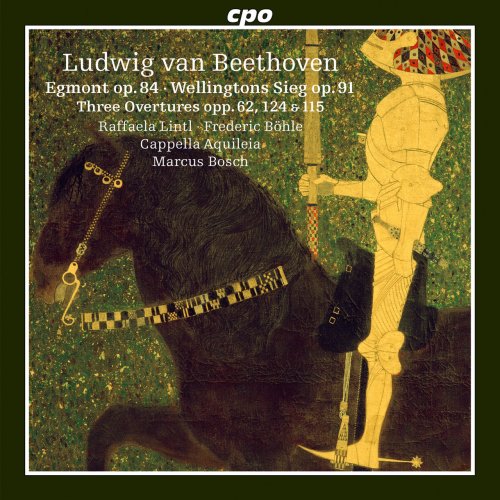
Marcus Bosch, Cappella Aquileia, Frederic Böhle, Raffaela Lintl - Beethoven: Orchestral Works (2021)
BAND/ARTIST: Marcus Bosch, Cappella Aquileia, Frederic Böhle, Raffaela Lintl
- Title: Beethoven: Orchestral Works
- Year Of Release: 2021
- Label: cpo
- Genre: Classical
- Quality: FLAC (tracks+booklet)
- Total Time: 01:16:19
- Total Size: 346 MB
- WebSite: Album Preview
Tracklist:
01. Egmont, Op. 84 (Adapted S. Knies)- Overture (6:37)
02. Vernommen habt ihr die Töne (2:37)
03. Egmont, Op. 84 (Adapted S. Knies)- I. Die Trommel (2:42)
04. So freue dich, denn kurz ist alle Freude (0:17)
05. Egmont, Op. 84 (Adapted S. Knies)- II. Entracte I (2:42)
06. Die List des Herzog Alba, den aus Spanien (1:33)
07. Egmont, Op. 84 (Adapted S. Knies)- III. Entracte I (3:39)
08. Freudvoll und leidvoll. Das ist das Los des Lebens (1:06)
09. Egmont, Op. 84 (Adapted S. Knies)- IV. Freudvoll u (1:19)
10. Egmont, Op. 84 (Adapted S. Knies)- V. Entracte III (3:15)
11. Umgarnt vom Netz des schlauen Jägers (1:21)
12. Egmont, Op. 84 (Adapted S. Knies)- VI. Entracte IV (2:45)
13. O Clärchen! Treues Herz! (0:55)
14. Egmont, Op. 84 (Adapted S. Knies)- VII. Clärchens (1:49)
15. Egmont, Op. 84 (Adapted S. Knies)- VIIIa. Melodram (4:00)
16. Egmont, Op. 84 (Adapted S. Knies)- VIIIb. Ja, führ (0:43)
17. Egmont, Op. 84 (Adapted S. Knies)- VIII. Siegessym (1:26)
18. Coriolan, Op. 62 (6:59)
19. Die Weihe des Hauses, Op. 124 (9:36)
20. Overtüre zur Namensfeier, Op. 115 (7:03)
21. Wellingtons Sieg, Op. 91, Pt. 1- Die Schlacht (8:05)
22. Wellingtons Sieg, Op. 91, Pt. 2- Sieges-Symphonie (6:05)
01. Egmont, Op. 84 (Adapted S. Knies)- Overture (6:37)
02. Vernommen habt ihr die Töne (2:37)
03. Egmont, Op. 84 (Adapted S. Knies)- I. Die Trommel (2:42)
04. So freue dich, denn kurz ist alle Freude (0:17)
05. Egmont, Op. 84 (Adapted S. Knies)- II. Entracte I (2:42)
06. Die List des Herzog Alba, den aus Spanien (1:33)
07. Egmont, Op. 84 (Adapted S. Knies)- III. Entracte I (3:39)
08. Freudvoll und leidvoll. Das ist das Los des Lebens (1:06)
09. Egmont, Op. 84 (Adapted S. Knies)- IV. Freudvoll u (1:19)
10. Egmont, Op. 84 (Adapted S. Knies)- V. Entracte III (3:15)
11. Umgarnt vom Netz des schlauen Jägers (1:21)
12. Egmont, Op. 84 (Adapted S. Knies)- VI. Entracte IV (2:45)
13. O Clärchen! Treues Herz! (0:55)
14. Egmont, Op. 84 (Adapted S. Knies)- VII. Clärchens (1:49)
15. Egmont, Op. 84 (Adapted S. Knies)- VIIIa. Melodram (4:00)
16. Egmont, Op. 84 (Adapted S. Knies)- VIIIb. Ja, führ (0:43)
17. Egmont, Op. 84 (Adapted S. Knies)- VIII. Siegessym (1:26)
18. Coriolan, Op. 62 (6:59)
19. Die Weihe des Hauses, Op. 124 (9:36)
20. Overtüre zur Namensfeier, Op. 115 (7:03)
21. Wellingtons Sieg, Op. 91, Pt. 1- Die Schlacht (8:05)
22. Wellingtons Sieg, Op. 91, Pt. 2- Sieges-Symphonie (6:05)
The compositions on this album, broadly considered, are connected with Beethoven’s efforts on behalf of the theater, and they also attest to his desire to compose for the larger public without having to lower his standards. The center here is formed by his music for Goethe’s Egmont.
The Dutch Count Egmont failed in his resistance against the tyrannous rule of the Duke of Alba and was executed. The decisive factor in Beethoven’s choice of this subject must have been that Goethe himself assigned a dramaturgically important role to music above all at the end of his play, and in his composition Beethoven followed these pretextual givens to the letter. When Egmont, in prison prior to his execution, sees the vision of his beloved Klärchen as the personification of liberty, then Egmont’s words and the musically designed vision join together in a melodrama.
The album also includes three overtures and Wellington’s Victory, in which Beethoven combines the older tradition of the “battaglia,” the musical depiction of a battle, with victory pathos. Its effect lies not so much in the masterful treatment of the musical material itself as in the development of a spatial dimension for a realistic battle scene and in the big sound overpowering the listener, in short: in its theatrical character. During Beethoven’s lifetime it was his most successful composition.
The Dutch Count Egmont failed in his resistance against the tyrannous rule of the Duke of Alba and was executed. The decisive factor in Beethoven’s choice of this subject must have been that Goethe himself assigned a dramaturgically important role to music above all at the end of his play, and in his composition Beethoven followed these pretextual givens to the letter. When Egmont, in prison prior to his execution, sees the vision of his beloved Klärchen as the personification of liberty, then Egmont’s words and the musically designed vision join together in a melodrama.
The album also includes three overtures and Wellington’s Victory, in which Beethoven combines the older tradition of the “battaglia,” the musical depiction of a battle, with victory pathos. Its effect lies not so much in the masterful treatment of the musical material itself as in the development of a spatial dimension for a realistic battle scene and in the big sound overpowering the listener, in short: in its theatrical character. During Beethoven’s lifetime it was his most successful composition.
Year 2021 | Classical | FLAC / APE
As a ISRA.CLOUD's PREMIUM member you will have the following benefits:
- Unlimited high speed downloads
- Download directly without waiting time
- Unlimited parallel downloads
- Support for download accelerators
- No advertising
- Resume broken downloads


